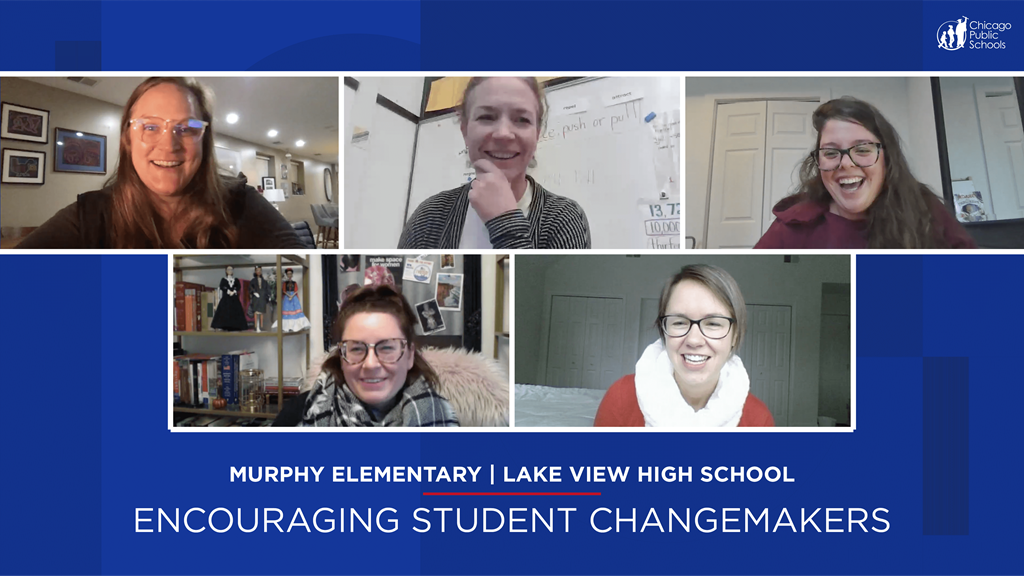Helping Students Find their Voice through Election-Based Instruction
03 November 2020
Educators at every grade level empower students to remember that their voice matters.

A book called The World Needs More Purple People prompted a student to speak out about how voting is an important form of standing up for what you believe in. An article about the requirements to become president caused some students to be up in arms after learning that you have to be born in the United States. And reading Grace for President led to a passionate discussion about why there has never been a female president.
In addition to highlighting the inspiration that can come from reading, third-grade classrooms at John B. Murphy Elementary prove that students are never too young to discover what they are passionate about. Ms. Danielle Munsen, who teaches diverse learners, believes that keeping her instruction anchored in what her students are seeing and experiencing has helped her empower her students around this year’s presidential election.
“Developmentally, our students are still focused on themselves and what is right around them because that makes the most sense in their world,” said Ms. Munsen. “Our conversations on government have started with talking about what it means to be a part of a community and to belong in something, as well as how they want to give back to their community.”
Through open-ended writing prompts, students are given an outlet to share some of their ideas for running the country. Responses have ranged from ending homelessness to stopping COVID-19 to giving money to everyone who needs it. Ms. Annalissa Colombo, who also teaches diverse learners, stresses the importance of preserving this sense of idealism so that students aren’t discouraged from pushing for positive social change in the future.
“My students are thinking about some of the issues that are at the heart of this year’s election; they just might not be able to fully express them verbally yet,” said Ms. Colombo. “Still, they are super passionate. I feel like I am helping mold changemakers.”
Cultivating each student’s unique ideas becomes even more important when you consider that third-grade students at Murphy are only three elections away from being old enough to vote for president themselves. Veteran educator Ms. Bridget Brandon has seen some ideas at Murphy, such as a student newspaper, grow as students get older. While she admits that remote learning is a challenge, there is one positive that she is thankful for.
“Remote learning has provided our students with more opportunities to do creative projects, which they are very thoughtful about,” said Ms. Brandon. “We give them a prompt like: ‘Explain why it is important to vote’ and they record these skits that their little brother or mom acts in with them. It’s really powerful and something that I know they will remember since they could never do that in a typical classroom setting.”
Educators at Lake View High School also see remote learning as an asset in some ways to engaging students around divisive political issues. The backbone of their instruction is the district’s Participate Civics curriculum, which encourages and empowers students to actively participate in democracy based on the power that they hold in their community. This curriculum is supplemented with popular virtual tools like Pear Deck that allow students to share how they feel about a certain issue just by clicking on a section of their screen.
While Ms. Kristin Hu, who teaches civics, says that most of her students have political views that reflect Chicago as a whole, she notes that the topics they have wanted to talk about have been unpredictable because they have been shaped by day-to-day news.
“The passing of Justice Ginsburg, for example, shook up my classroom dynamic and is why reproductive rights has been a larger topic in student discussions,” said Ms. Hu. “We pivoted a little bit to look at abortion laws and rates across the country to get past the political rhetoric so that our conversations could be rooted in facts.”
On the day after the election, both Ms. Hu and her colleague Ms. Kathleen Mahoney say that while they plan to give students an open space to talk and debrief, they plan to help them channel their thoughts using three categories: what I observe, how I feel, and what questions I have.
With results still uncertain and fast-approaching, both educators could write down paragraphs worth of their own thoughts under the how I feel section. But one feeling seems to be standing out among the rest.
“Based on what I see in the ‘adult world’ versus observing my students, I do feel a lot of hope,” said Ms. Mahoney. “They are really brilliant people, and they are empathetic, care about others, and have amazing ideas.”
Curious about what other social science and civics educators are focusing on this week? Make sure to follow the district’s Department of Social Science and Civic Engagement on Twitter and Instagram at @CPSCivicLife.
Related Stories
25 April 2025
Taking a Leap of Faith: First-Year AP Shares Her Journey to School Leadership
AP Jordan thrives in leading with compassion and love each and every day.
24 April 2025
Creating and Collaborating in Broadcasting Class: Take Five with Roderick Haygood
Before joining CPS, Mr. Haygood gained valuable on-the-ground experience working as a television and radio station supervisor.
23 April 2025
Making a Difference for Students with Disabilities
Ms. D'Vignon sees the importance of ensuring that her students receive a quality education and have a rightful presence in the classroom.
18 April 2025
Celebrating Mariachi in Music Class: Take Five with Phillip Olazaba
Mr. Olazaba is known for being a caring teacher who has high expectations while still making learning fun.




